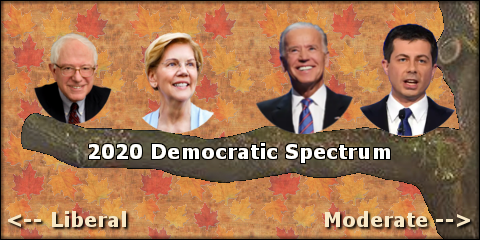~~~ Happenings ~~~
November 3, 2019: The Democratic Dilemma, Part 1
The four leading Democratic candidates:
~~~ The Issues ~~~
I) Health Care:
Medicare for All
Proponents: Bernie Sanders and Elizabeth Warren.
The Medicare for All Act would replace private insurance with government as the single payer. It will provide comprehensive health care to every man, woman and child in our country -- without out-of-pocket expenses. No more insurance premiums, deductibles or co-payments.
Cost:
$20 to $50 trillion over ten years.
How is it funded:
1) Increase in payroll tax rates and self employment tax.
2) Increase in the inheritance tax rate.
3) New taxes on the wealthy, big corporations and financial institutions.
Joe Biden's Plan:
Some call it "Affordable Care Act 2.0". He wants to "build on" what Obama did by adding a public option as the best way to lower costs and cover everyone. He has gone on record as critical of Medicare for All.
Mayor Pete's Plan:
"Medicare for All Who Want It". He calls this a middle-of-the-road approach that allows people to opt into a government-backed health insurance option but lets them keep their private insurance plans if they like them.
What Republicans Think:
They believe the cost for funding Medicare for All totally unworkable. They stand for tax cuts not tax increases. They not only do not like the ACA but tried hard to repeal and replace it. Many Republicans abhor the idea of the wealthy subsidizing the poor and middle class. They blame the rising national debt on the exorbitant amount of entitlements. Many Americans feel the same way.
One Republican's Statement on the Rising Deficit:
"It's disappointing, but it's not a Republican problem. It's a bipartisan problem: Unwillingness to address the real drivers of the debt by doing anything to adjust those programs to the demographics of America in the future."
Mitch McConnell, (R KY), Senate Majority Leader
Bloomberg Interview, 16 October, 2018
The senator is undoubtably an intelligent person but he is doing what in football parlance is called an End Around. I will apply a little political math to help clarify his statement.
The deficit is "...not a Republican problem. It's a bipartisan problem"
So, bipartisan problem - Republican problem = Democrat problem.
"Unwillingness to address... the debt by doing anything to adjust those programs..."
Those programs = Medicare, Medicaid and Social Security.
"...demographics of America in the future."
Demographics context = Aging US population.
According to the U.S. Census Bureau's 2017 National Population Projections. By 2030, all baby boomers will be older than age 65. This will expand the size of the older population so that 1 in every 5 residents will be retirement age. That equates to more people receiving what are referred to as entitlements.
Final question: What is the Republican plan to adjust those programs?
1) Cuts to Medicare, Medicaid and Social Security benefits.
2) Repealing ACA's Medicaid Expansion.
3) Raising Medicare's eligibility age.
4) Income based increase in Medicare premiums.
The Congressional Budget Office blames the increasing national deficit on recent legislation, including the 2018 Budget Agreement and the 2017 Tax Bill. The Republican solution is to offset this deficit by cutting benefits to senior citizens and qualified individuals and families based on disability or income.
Source: Pacific Standard, Who's to Blame?
